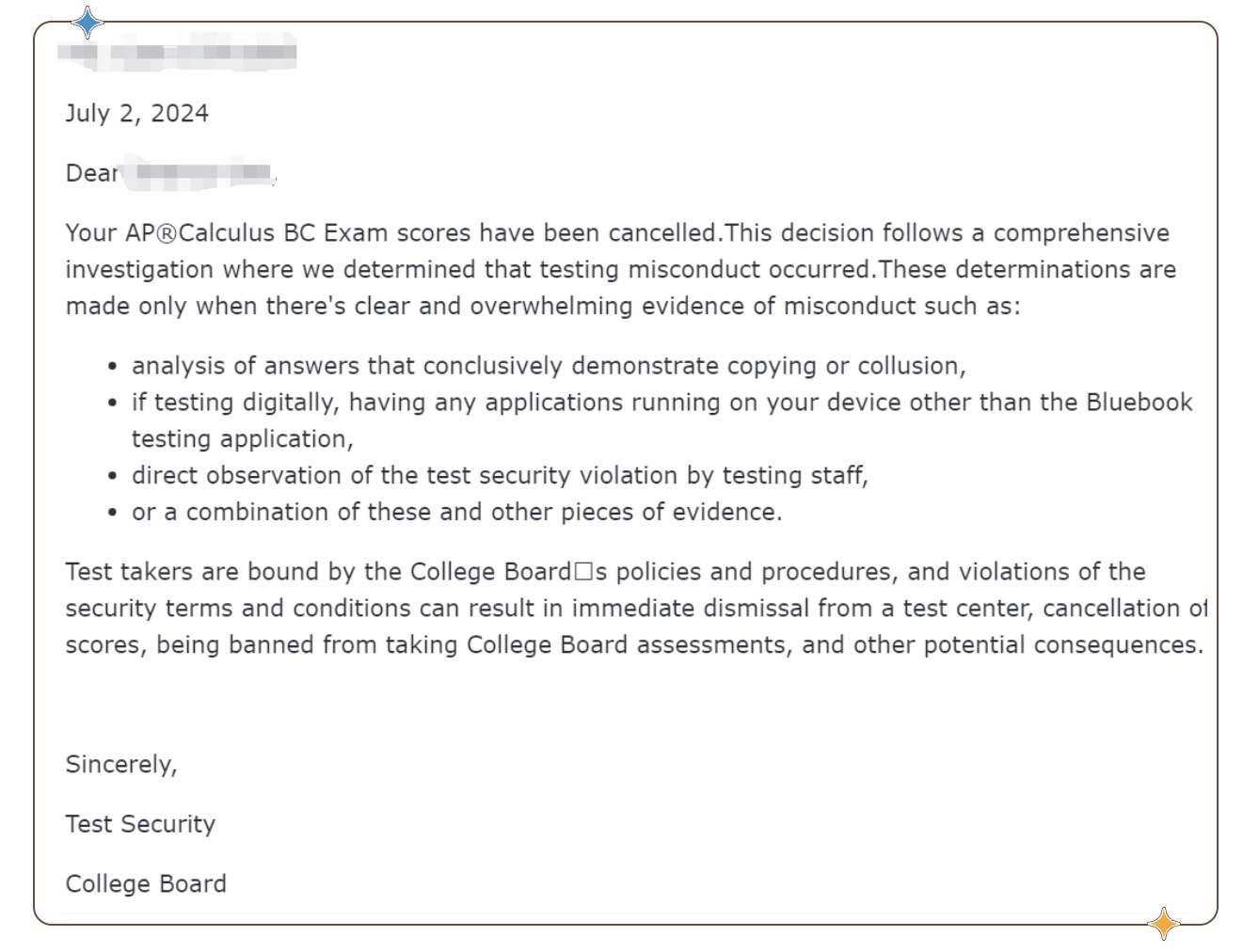On July 2nd, many high school students in Beijing, Shanghai, and the United States received an email from College Board claiming their Advanced Placement (AP) scores from tests taken in May were cancelled due to misconduct. In other words: cheating.

Screenshot of email from College Board
In the email from College Board, the testing company stated the decision “follows a comprehensive investigation where [test security]determined that testing misconduct occurred. These determinations are made only when there’s clear and overwhelming evidence of misconduct such as:
– Analysis of answers that conclusively demonstrate copying or collusion.
– If testing digitally, having any applications running on your device other than the Bluebook testing application,
– Direct observation of the test security violation by testing staff,
– Or a combination of these and other pieces of evidence.”

AP is a set of standardized subject tests that form the basis of the high school curriculum of many American college preparatory schools, as well as many international schools in China.
Students scoring high on AP tests use this as a testimony to the rigor of their high school studies for their college applications. Typically, students take four to eight AP courses across their sophomore, junior, and first part of senior year.
In Beijing, the exams take place annually at international schools that offer AP courses or at commercial testing centers during the first two weeks of May and are only offered once a year.
China has the highest number of AP test takers outside of the United States.
This year, subjects like Economics, Calculus, Psychology, Statistics, Biology, Physics, Environmental Science, and Chemistry all have canceled scores, affecting what could be up to tens of thousands of students in multiple countries.
One week before the AP exams occurred in May of this year, rumors of leaked questions were rampant on Chinese social media. Outside testing centers, some tutoring institutions openly advertised no-fee “secret question prep clubs” to prove to students that they had access to real-time AP test questions.
Rumors of time zone cheating, in which those who take the test first give answers to people taking the test in a later time zone, stirred up more stress and anxiety.
One test taker saw other students selling and buying answers just outside the walls of a commercial test center. A few hours later, three subject exams were canceled immediately, even before scoring

College Board uses screening techniques that detect similar answers from test-takers in the same testing center. It is often difficult to pinpoint exactly who is responsible for the cheating, so oftentimes everyone who took the same exam in the same testing center pays the price.
The AP is only offered once a year, so canceled scores can significantly hinder the college application process, leading to panic amongst agencies, tutors, parents, and schools.
For those who did not cheat but whose scores were canceled anyway, the next step is to appeal to College Board. Many students appeal with their semester transcripts to prove their academic integrity.
Others seek a Plan B, such as asking for explanations of the mass cancellation from school counselors and teachers who write their recommendation letters.
In lieu of that, the only thing to do is wait for next year’s test or decide to skip the tests entirely.
However, some suspect the notifications could be a scam and suggest test-takers check College Board’s website on July 8, the official date of the AP results, to see if their scores are reported.
Many dub College Board’s decision unfair, as it often punishes the innocent as well as the guilty indiscriminately. What do you think? Did you or your children take the AP Exam this year? Let us know below!
Images: Pexels




